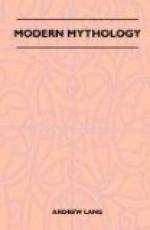Anthropologists demonstrate that the belief in this universal kinship, universal personality of things, which we find surviving only in the myths of civilised races, is even now to some degree part of the living creed of savages. Civilised myths, then, they urge, are survivals from a parallel state of belief once prevalent among the ancestors of even the Aryan race. But how did this mental condition, this early sort of false metaphysics, come into existence? We have no direct historical information on the subject. If I were obliged to offer an hypothesis, it would be that early men, conscious of personality, will, and life—conscious that force, when exerted by themselves, followed on a determination of will within them—extended that explanation to all the exhibitions of force which they beheld without them. Rivers run (early man thought), winds blow, fire burns, trees wave, as a result of their own will, the will of personal conscious entities. Such vitality, and even power of motion, early man attributed even to inorganic matter, as rocks and stones. All these things were beings, like man himself. This does not appear to me an unnatural kind of nascent, half-conscious metaphysics. ‘Man never knows how much he anthropomorphises.’ He extended the only explanation of his own action which consciousness yielded to him, he extended it to explain every other sort of action in the sensible world. Early Greek philosophy recognised the stars as living bodies; all things had once seemed living and personal. From the beginning, man was eager causas cognoscere rerum. The only cause about which self-consciousness gave him any knowledge was his own personal will. He therefore supposed all things to be animated with a like will and personality. His mythology is a philosophy of things, stated in stories based on the belief in universal personality.
My theory of the origin of that belief is, of course, a mere guess; we have never seen any race in the process of passing from a total lack of a hypothesis of causes into that hypothesis of universally distributed personality which is the basis of mythology.
But Mr. Max Muller conceives that this belief in universally distributed personality (the word ‘Animism’ is not very clear) was the result of an historical necessity—not of speculation, but of language. ’Roots were all, or nearly all, expressive of action. . . . Hence a river could only be called or conceived as a runner, or a roarer, or a defender; and in all these capacities always as something active and animated, nay, as something masculine or feminine.’
But why conceived as ‘masculine or feminine’? This necessity for endowing inanimate though active things, such as rivers, with sex, is obviously a necessity of a stage of thought wholly unlike our own. We know that active inanimate things are sexless, are neuter; we feel no necessity to speak of them as male or female. How did the first speakers of the human race come to be obliged to call lifeless things by names connoting sex, and therefore connoting, not only activity, but also life and personality? We explain it by the theory that man called lifeless things male or female—by using gender-terminations—as a result of his habit of regarding lifeless things as personal beings; that habit, again, being the result of his consciousness of himself as a living will.




